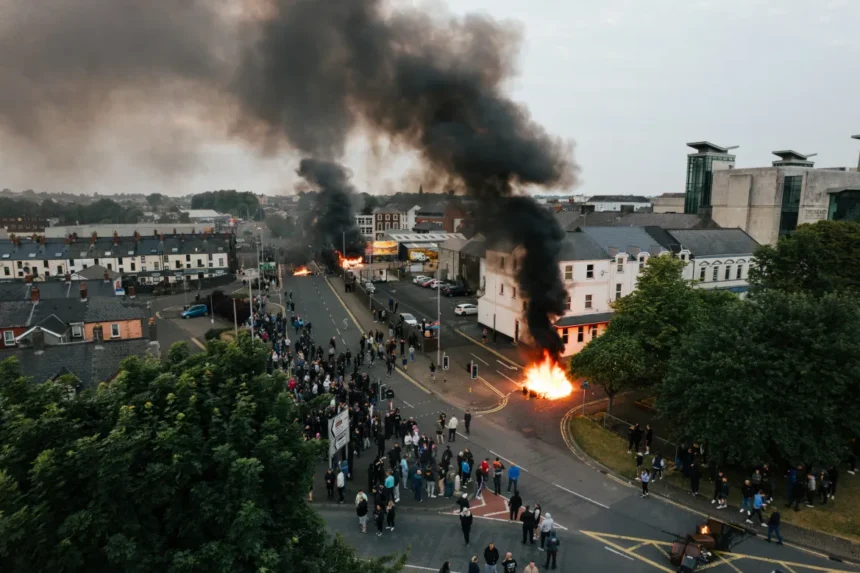Introduction
The Northern Ireland anti-immigration riots that began in Ballymena mark a disturbing surge of xenophobic violence. Sparked by a criminal case involving Romanian teens, these riots expose deep fractures fueled by far-right narratives, economic frustration, and identity-based tensions Northern Ireland anti-immigration.
What Triggered the Ballymena Riots?
On June 9, 2025, two Romanian teenagers were arrested over an alleged assault. Protests in Clonavon Terrace escalated quickly, with masked individuals attacking migrant homes and police vehicles. The violence spread rapidly to Larne, Portadown, and Belfast.
Who Is Behind the Violence?
- Far-right groups and Loyalist networks are being investigated for orchestration of the riots. The Committee on the Administration of Justice (CAJ) has reported the rise of white nationalist propaganda in Northern Ireland. Read CAJ’s report here.
- Locals affected by austerity measures and welfare cuts often scapegoat migrants as job or housing threats.
- Organized rioters used online platforms to coordinate attacks, reminiscent of past Loyalist disturbances.
Why Is This Happening in Northern Ireland?
Despite migrants making up only 3.4% of the population, the fear-driven rhetoric paints them as a threat. Post-Brexit uncertainty and working-class disenfranchisement have created fertile ground for far-right groups to manipulate emotions.
A detailed analysis by The Guardian shows that these tensions aren’t economic alone—many rioters come from relatively stable neighborhoods, suggesting deeper issues of power, identity, and distrust.
Fuel from Social Media and Political Rhetoric
The CAJ found widespread dissemination of “replacement theory” content across social media channels in Northern Ireland. False rumors of migrant buses and criminal behavior were shared by extremist forums, amplified by fringe political actors.
Even elected figures like DUP’s Gordon Lyons and councillor Tyler Hoey have been accused of enabling unrest by sharing shelter locations online. Full coverage by BBC News outlines their controversial role.
How Are People Responding?
Despite the violence, Northern Ireland has shown growing acceptance. A 2023 Equality Commission survey revealed that 94% of residents would accept someone of a different ethnic background as a neighbor—up from 53% in 2005.
Political leaders like Michelle O’Neill and Naomi Long have condemned the attacks, calling for unity and policy reform. Police are continuing arrests, and government responses are intensifying.
Conclusion: Addressing Root Causes
The Northern Ireland anti-immigration riots are not isolated—they reflect long-standing socio-political fractures. Fighting back means pushing for accountability, cracking down on hate speech, and addressing deeper economic and cultural insecurities.
📌 For a broader geopolitical overview, read our G7 Summit 2025 Recap.
🚨 For humanitarian crisis coverage, visit our in-depth blog on the Gaza airstrike tragedy.


